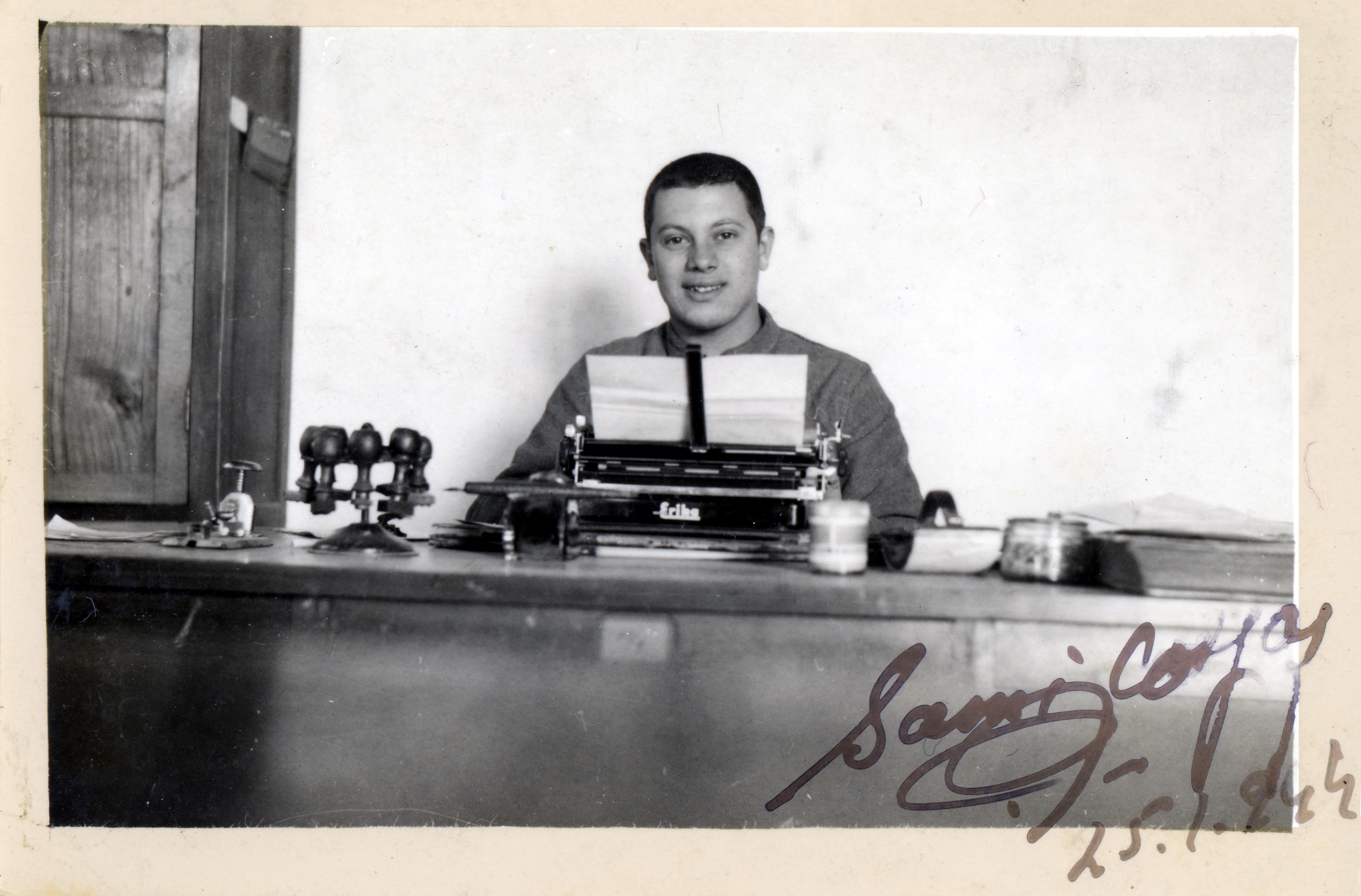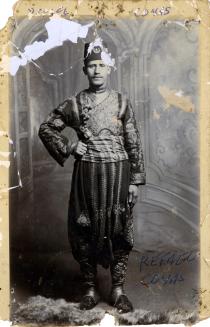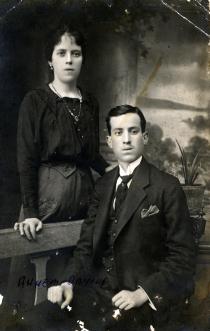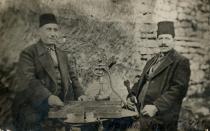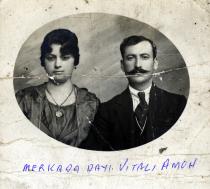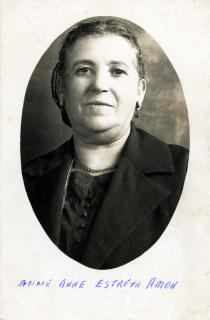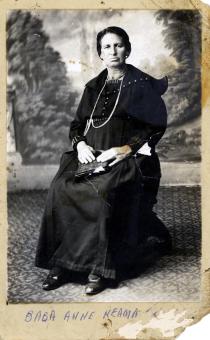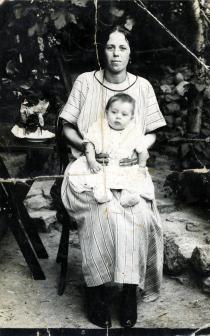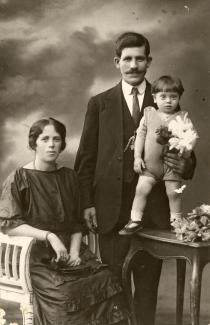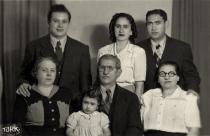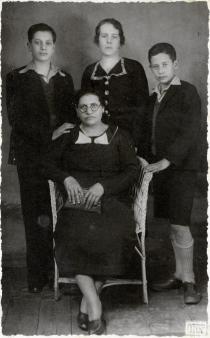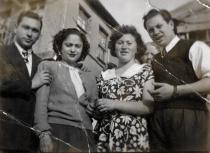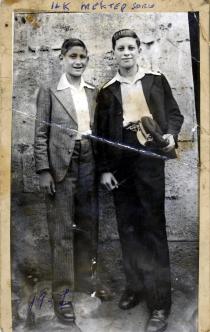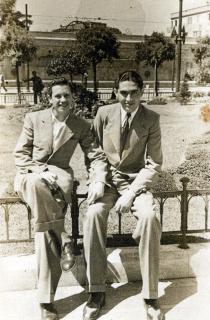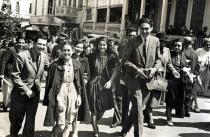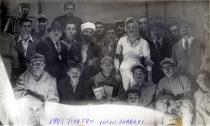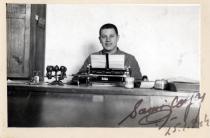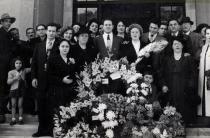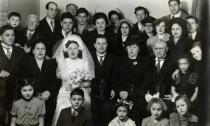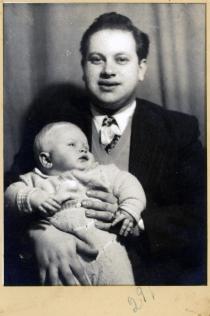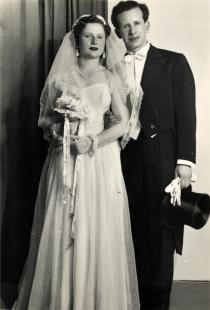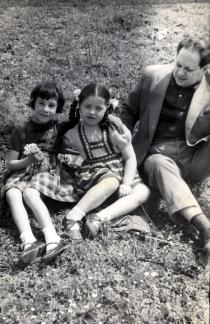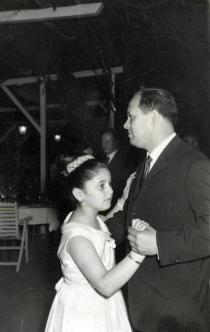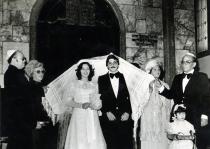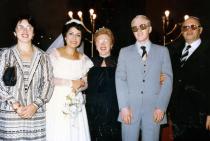This photo was taken on 25 January 1944 during my military service in Adana. You can see me at the office because I was working as a clerk. I used to type all the documents that were sent to me. I am wearing the brown uniform that the non-muslims were given to wear at that time.
I was drafted at the age of 19, on the 25th of October, in 1942. World War II was going on with all its violence. I did my military service for 3.5 years, in Akhisar, Adana, and Ankara, consecutively. They gathered all of us at the Sultan Ahmet Mosque in Eminonu [also known as the 'Blue Mosque'] before the first distribution to our units. We were very crowded. They kept us waiting there for three days. We slept on the floors. The toilets were very dirty. They took us to a hamam, near the Sirkeci synagogue on the last day. The water wasn't running properly. We stepped into the showers with our shoes on. They sucked our clothing into very hot pipes called "irons", and killed all the microbes. Then the posting started. They put us on ships filled with sheep and goats, and took us to Bandirma [the Asian side of the Sea of Marmara]. There, we were placed in black wagons over one another, which were like the ones that carried the Jews during World War II. We arrived in Akhisar in the morning [a suburb, in the Aegean Region]. They gave us a ration of food, comprised of olives, raisins, and tahina. Then, with heavy backpacks on our backs, we walked for 25 km. till we reached the 18th battalion. They vaccined everyone for typhoid fever. They sent us to Devebagirtan, after having worked at the road construction for two months. There, they separated the Jews and the Armenians, and sent us, the Jews to the so-called Jewish Farm [Kayalioglu School, it was built by Jews that had settled in Akhisar (near Konya). Students would learn agriculture, applying its theories in the gardens and fields that belonged to the school and they even had a winery in the basement of the school building.] in Manisa [a town in the Aegean], which had a big "siyon" [magen David] at its gate. Jews used to live there in the past. After staying there for one or two days, they sent us to Ankara. There were a lot of young Jews who were doing their military service at the Ankara Youth Park. They sent me to the Cubuk Dam, which was in the vicinity. The soldiers used to drink alcoholic beverages regularly, there. When a group of us, in which I was also included, complained about this to the higher officials, we were sent to the Adana Road Headquarters Seyhan River regulator construction [a town in the Mediterranean], for being informers. The Germans were doing the construction, and using the soldiers as workers. Three of us would walk, the dam's water running below us, on the narrow wooden beams, which were 50-60 meters high, and carry another beam on our shoulders. My legs used to shake from fear. A few days later, the commander took me as an adjutant near him, upon his wife's wish, who had just given birth to their child. Most of the people at the Road Construction were rough people. (95% of them were Armenians). I guess, the commander had chosen me because I was young and had decent looks. As an adjutant, I did the cleaning and shopping, briefly doing everything that was asked from me. In this way, I was saved from carrying beams up on the heights. After two months, when the commander was assigned somewhere else, I asked to be appointed to another post in order not to return to my old one. Upon this, I was assigned to Taskopru [an administrative district of Adana] Team Chief Commandership, as a typist. I learned how to type there. The other soldiers were working at the road construction. The famous singer, Dario Moreno, was also with us. He used to sing and play his guitar at the Adana Officer's Club.
Each time some part of the road construction was completed, our unit would move on towards the border. Except for the work, life here was very monotonous. We were in the middle of open fields, like deserts, and slept in tents. There were a lot of Armenians among us. Anyways, the Armenians were always given to Road Works. One of them was a skilled actor; I don't remember the name now. One day he asked our commander to allow him to stage a play. He started to get prepared when our commander gave him permission to do so. He gave a job to everyone. Soon, a stage was constructed with the beams and pieces of wood that were scattered around. Our actor friend gave everyone a part to play and put the play "A good judge of people" on stage. [The play was based on Andre Maurois novel.] I played a woman's role, because of my "petite" looks. I don't remember the subject, but the play was a comedy. We had prepared a lot, and memorized our lines. Most of our Armenian friends were talented in the arts, and thus prepared all of our costumes, sets, and make-up. They had me wear a dress, and a bonnet, and with the make-up done, they turned me into a good-looking lady. We put the play on stage, 3-4 times. The commanders and the other soldiers watched us in laughter.
The road had reached Ceyhan. [An administrative district of Adana]. The commander here would drink at nights, and then go into the tents of the soldiers, and either make them sing or beat them.
Due to the events which had taken place in history, they would approach the Armenians with doubt, and wanted to keep them together in front of their eyes. Furthermore, when one day the news spread that President Ismet Inonu, would pass through Adana, as a preventive measure, they drew the Armenians from the construction for a few days. They usually had the Jews work for airport construction at the Air Force Headquarters.
The road construction in Adana reached Hassa [border gate of Iskenderun with Syria]. We were changing places according to the construction. One day (in 1944), we heard that 18 Jewish soldiers on road construction, two of whom were from Kuzguncuk, fled to Israel [British mandate Palestine] through Syria [French mandate]. I was the first one to hear the news because I was working in the office. That year they abolished the Road Construction Units. [These units were created without legal authorization. Non-Muslims were drafted there to make sure by the military elite that all those, considered unreliable are at one place, under controll and without arms.] They sent me and two of my friends to do office work at the Ankara Mobilization Head Office. There, we had the chance to read top secret documents (they had two moons on them as a marker). Most of them included warnings about Armenians, saying that they should be watched closely. We demolished all the documents, by tearing them.
